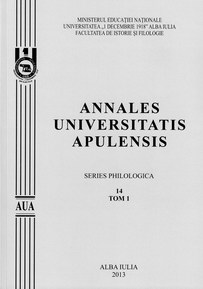« Les mille et une nuits débarquent dans la crèche » : Gaspard, Melchior et Balthazar de Michel Tournier ou l’éloge de la diversité culturelle
« The Thousand and One Nights Land at the Crèche » : Gaspard, Melchior and Balthazar by Michel Tournier or the Praise of the Cultural Diversity
Author(s): Mathilde BatailléSubject(s): Literary Texts
Published by: Universitatea »1 Decembrie 1918« Alba Iulia
Keywords: literature; Michel Tournier; Magi legend et rewriting; cultural exchanges; otherness
Summary/Abstract: Michel Tournier is a travel writer who for years has shared his time between Choisel, a small French village in Vallée de Chevreuse, and worldwide peregrinations especially in Germany and in Maghreb. Spending two years studying ethnography with Claude Lévi-Strauss has contributed to shape his taste for travel and his curiosity regarding foreign cultures. This opening up to the world and to people is one of the characteristics of Tournier's novels such as Gaspard, Melchior et Balthazar (1980). We propose to demonstrate that in this novel relatively unstudied by critics Tournier's free interpretation of the Magi legend is developed for praising the dialogue among cultures and the wealth of alterity. In Célébration de l'offrande Tournier explains his sensibility for the Magi legend and for the universal symbol it embodies. Originally, by their skin colour the Magi recall that the message of Christ is directed to everybody, foreigners and heathens included. From this symbolic and leveraging blanks left by the Gospel according to St. Matthew, Tournier insists in his story on the meeting of cultures using the identity and the concerns he gives to each of the Magi. However, this sensitivity to intercultural dialogue goes beyond a mere thematic thought and is part of the aesthetic of the novel. Gaspard, Melchior et Balthazar is inspired by various cultural sources. In particular, we focus on Tournier's pictorial (initially Italian) and literary (French, German, and American) influences and on their meaning that make the originality of this novel described by Tournier as « Les Mille et Une Nuits débarqu[ant] dans la crèche » (Tournier, 1998: p. 8). Given this polyphony, the notion of “novel of Christianity” developed by some critics is then examined. In our opinion, despite being Christian Tourier did not try to make a Christian novel. As an argument, we show that the analyze of these three themes is rich in intertextuality that contributes to overlay to the Christian vision of human destiny concepts from other wisdoms and traditions.
Journal: Annales Universitatis Apulensis. Series Philologica
- Issue Year: 14/2013
- Issue No: 2
- Page Range: 69-82
- Page Count: 14
- Language: French

